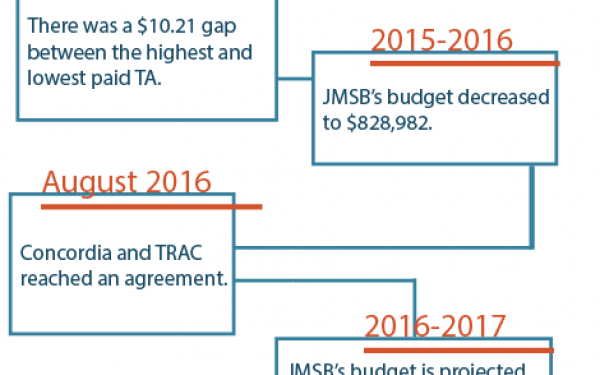Teaching Assistants Talks Upset, Part-Time Faculty Negotiations Hopeful
CUPFA and TRAC Presidents React to Concordia Severance Package
As the semester comes to a mid-point, two of Concordia’s teaching unions remain out-of-contract, or without a salary agreement.
Concordia University Part-time Faculty Association doesn’t have a new collective agreement and is in the process of negotiating monetary issues with the university. Both sides have presented their offers as further bargaining steps will come next. CUPFA has been out of a contract since May 2015.
“There’s some distance between where we are, but we’re talking with them,” said David Douglas, CUPFA President.
Concordia President Alan Shepard said that negotiations are going well, and he’s very hopeful that the university will reach an agreement with CUPFA.
“The issues that we have are significant and it will take some time to work our way through them,” Douglas said. “There is good will.”
CUPFA is demanding better salaries and course loads for part-time faculty, which have seen a reduction in the number of classes offered over the last few years.
“We have been the ones hit particularly hard by the retro budget cuts that Quebec threw at Concordia a couple years back,” Douglas said.
Since then, the budget cuts that followed have continued to affect part-time professors, he added. Changes are also coming for university employee pension plans that will increase the contribution ratio for employees to 50 per cent.
The union for Teaching and Research Assistants at Concordia was supposed to renegotiate pay grades for the 2015-2016 year before May 2015. Talks were stalled in the fall after Concordia refused to offer teaching assistants a single pay rate for Undergraduate, Master’s and PhD students based on their job description.
TAs are central to academic institution, Shepard said, calling them “valued members of the team.” He couldn’t provide further comment on negotiations with TRAC, saying he didn’t want to “comment on labour negotiations through the paper.”
TRAC President Nader Jafar Nodoushan says the university is backtracking on an agreement to offer all TAs the same pay based on their level of education. This agreement was made during contract negotiations two years ago.
“Concordia University will not accept the difference between Concordia’s proposal and union’s demand which was just around $360,000 for around 1,700 TAs, but they accept to pay one person $235,000 as a severance/compensation package,” Nodoushan wrote in an open letter.
His statement refers to a one-year salary severance package given to Concordia CFO Sonia Trudel, who was at the university for less than three months. Nodoushan says the amount TRAC is requesting to level pay rates will cost an additional $360,000 per year. Concordia President Alan Shepard’s salary was $370,000 in 2015-2014.
“Losing a senior administrator who has just been hired is not a good thing,” Douglas said about the severance paid to Trudel. “It certainly raises a lot of questions about the hiring process.”
“Losing a senior administrator who has just been hired is not a good thing,” — David Douglas, CUPFA President
The university has not provided explanation about the CFO’s termination, except that it was “amicable.”
Douglas says he isn’t surprised with the severance package, but doesn’t agree with the amount given to Trudel.
“To find someone who’s capable of filling the CFO position, you need someone who can operate on a budget of scale,” Douglas said. “That’s not everybody, but I’m not necessarily convinced that you need someone who could do the same thing in the private sector.”
The roles and perks of being a business executive versus a university senior admin don’t compare, because they are operating in different economies, Douglas said.
“We’re not the private sector, we’re the public sector.”

_900_600_90.jpg)



_600_375_90_s_c1.jpg)
_600_375_90_s_c1.jpg)